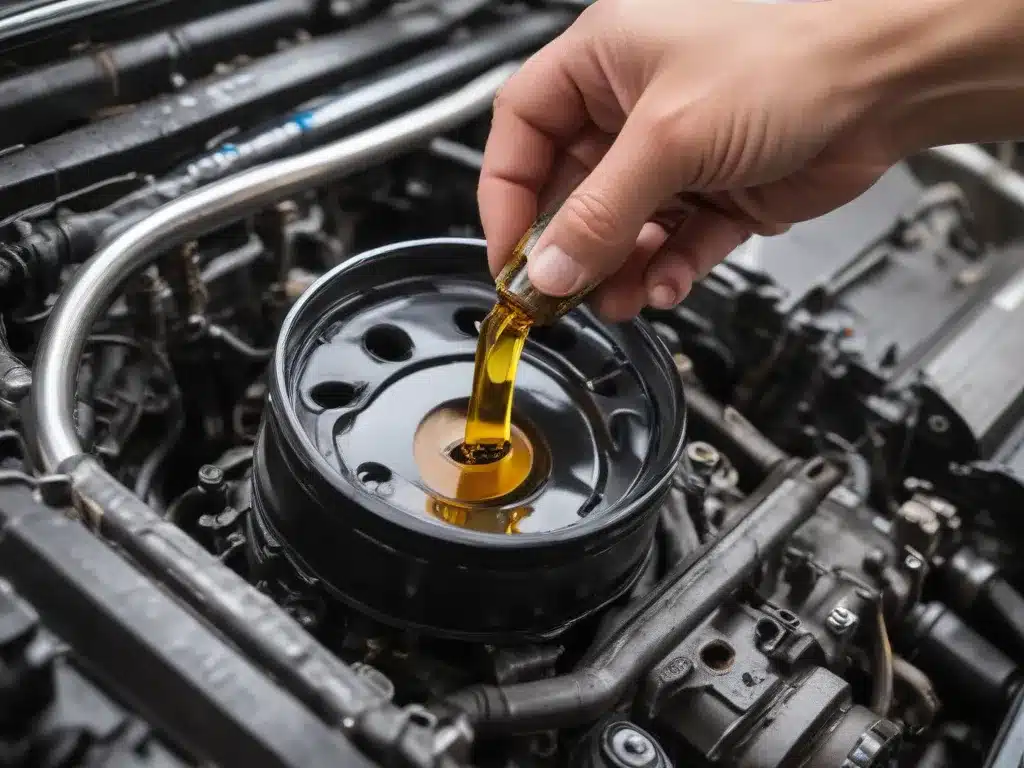
Synthetic Oil: The Debate Rages On
As a car enthusiast, I’ve always been fascinated by the ongoing debate surrounding synthetic oil and its impact on older engines. It’s a topic that’s been hotly discussed in garages and online forums, with passionate opinions on both sides. So, let’s dive in and explore this issue in-depth, shall we?
You see, the question of whether synthetic oil can damage older engines is one that’s been weighing on the minds of many car owners. After all, we want to make sure we’re taking the best possible care of our beloved vehicles, and the last thing anyone wants is to inadvertently cause harm to their engine. It’s a conundrum that’s got people scratching their heads and searching for answers.
The Pros and Cons of Synthetic Oil
Now, to understand this issue, we need to first take a closer look at the characteristics of synthetic oil. Synthetic oil is a man-made lubricant that’s engineered to be more consistent and stable than traditional mineral-based oils. It’s designed to withstand higher temperatures, maintain its viscosity better, and provide superior protection against wear and tear.
| Pros of Synthetic Oil | Cons of Synthetic Oil |
|---|---|
| Improved engine performance | Potential compatibility issues with older engines |
| Enhanced fuel efficiency | Can be more expensive than conventional oil |
| Longer oil change intervals | Concerns about potential damage to seals and gaskets |
| Superior protection against wear and tear | Potential for increased oil consumption in older vehicles |
On paper, the benefits of synthetic oil seem pretty compelling, don’t they? I mean, who doesn’t want their engine to run more efficiently and last longer? But here’s the rub – some folks believe that the very qualities that make synthetic oil so appealing can also be its downfall when it comes to older engines.
The Concerns About Synthetic Oil and Older Engines
The argument goes something like this: Synthetic oil’s enhanced detergency and cleaning properties can actually dislodge sludge and deposits that have accumulated in older engines over time. Now, this might sound like a good thing, but hear me out.
You see, those deposits can actually help to seal and protect aging engine components, like seals and gaskets. When the synthetic oil comes in and starts dissolving all that gunk, it can expose those vulnerable parts to wear and tear, potentially leading to leaks, oil consumption, and other problems.
And let’s not forget about the viscosity factor. Older engines may have been designed to operate with thicker, more traditional oil. Switching to the thinner, more slippery synthetic stuff can cause those tight engine tolerances to loosen up, leading to increased oil consumption and even engine wear.
Real-World Experiences and Anecdotes
Now, I know what you’re thinking – this all sounds a bit theoretical, doesn’t it? Well, let me tell you, I’ve heard plenty of real-world stories from fellow car enthusiasts that seem to back up these concerns.
Take my buddy, Dave, for example. He’s been working on cars for longer than I’ve been alive, and he swears by conventional oil for his ’87 Mustang. “I tried switching to that fancy synthetic stuff a few years back,” he told me, “and let me tell you, it was a disaster. My oil consumption went through the roof, and I even had a few leaks pop up. I went right back to the good ol’ conventional oil, and my car’s been running like a champ ever since.”
And then there’s my neighbor, Sheila, who had a similar experience with her vintage Volkswagen Beetle. “I read all these articles about how synthetic oil is the way to go,” she said, “but when I made the switch, my engine started making some really concerning noises. Turns out, it was wreaking havoc on the seals and gaskets. I had to have the whole thing rebuilt, and it cost me a small fortune.”
Striking a Balance
Now, I don’t want to scare you off synthetic oil entirely. After all, the benefits are real, and many modern engines are designed to work seamlessly with the stuff. But when it comes to older vehicles, it’s clear that you need to tread carefully.
The key, I think, is to strike a balance. Maybe consider a high-quality synthetic blend oil, which can provide some of the benefits of synthetic without being quite as aggressive on those aging engine components. Or, if you’re really concerned, you could even stick with a good old-fashioned conventional oil and just make sure to change it regularly.
And let’s not forget about the importance of proper maintenance and monitoring. Keep a close eye on your oil consumption, listen for any unusual noises, and be ready to make adjustments if things start to go awry. It’s all about being proactive and staying on top of your car’s needs.
Conclusion: Proceed with Caution
At the end of the day, the decision to use synthetic oil in an older engine is a personal one, and there’s no one-size-fits-all answer. It really depends on the specific make, model, and condition of your vehicle.
But one thing is clear – you can’t just blindly switch over to synthetic and expect everything to be peachy. You’ve got to do your research, weigh the pros and cons, and be prepared to make adjustments if necessary.
So, if you’re the proud owner of an older car, I’d encourage you to tread carefully when it comes to synthetic oil. Keep an open mind, stay vigilant, and don’t be afraid to consult with a trusted mechanic. With the right approach, you can keep your beloved ride running strong for years to come.
And hey, if you’re ever in the market for some top-notch car maintenance and oil change services, be sure to check out autooilandfluid.com. They’re the real deal when it comes to keeping your engine happy and healthy. Happy driving, my friends!


